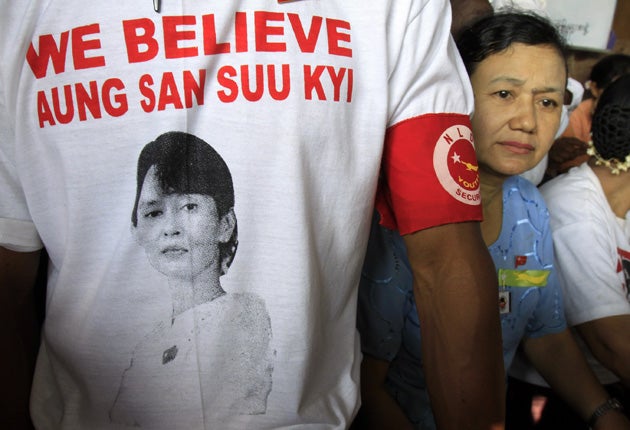Burma's opposition boycotts poll
Pro-democracy party backs Aung San Suu Kyi's response to 'unjust' elections

Your support helps us to tell the story
From reproductive rights to climate change to Big Tech, The Independent is on the ground when the story is developing. Whether it's investigating the financials of Elon Musk's pro-Trump PAC or producing our latest documentary, 'The A Word', which shines a light on the American women fighting for reproductive rights, we know how important it is to parse out the facts from the messaging.
At such a critical moment in US history, we need reporters on the ground. Your donation allows us to keep sending journalists to speak to both sides of the story.
The Independent is trusted by Americans across the entire political spectrum. And unlike many other quality news outlets, we choose not to lock Americans out of our reporting and analysis with paywalls. We believe quality journalism should be available to everyone, paid for by those who can afford it.
Your support makes all the difference.Loud cheering broke out at a meeting of the leaders of Burma's main opposition party after they voted unanimously to boycott an upcoming election that has been widely condemned as unfair and undemocratic.
The decision will further undermine the credibility of the poll. All 113 delegates at yesterday's gathering of Aung San Suu Kyi's National League for Democracy (NLD) agreed not to register the party with the election commission, effectively preventing it from participation in the polls that are expected to be held in October.
Speaking last night from Rangoon, senior NLD leader U Win Tin said: "By not registering under the election laws, it amounts to a boycott. There were one or two people who raised objections, but we were able to return a unanimous decision."
The former political prisoner accepted that by deciding not to participate in the poll, the NLD risked being "ignored" by the junta. But he added: "The world is looking for this process to be inclusive and for everybody to be involved. It is possible the world will ignore the junta too."
The NLD's decision had been widely expected ever since Ms Suu Kyi last week issued a statement through her lawyer that she believed her party should not participate in the polls because they were "unjust". While she said it was up to the party's central committee to make its own decision, her wishes would have been hugely influential. The 64-year-old Nobel laureate said the election laws announced by the junta that both prevented her from participating and forced her party to expel her if it wanted to field candidates, were undemocratic.
After its decision was announced, there were cheers from delegates. A statement later issued by the party said: "After a unanimous vote of the central executive committee, the NLD party has decided not to register as a political party because the election laws... are unfair and unjust."
It will be some time before the NLD knows whether its gamble pays off. According to the election regulations, those parties deciding not to participate in the polls will not be legally recognised.
Donald Seekins, a Burma expert at Japan's Meio University, said: "They've chosen purity over pragmatism. But they'll no longer be able to enjoy a legal existence as a party, and will have to reconstitute themselves as some sort of civil society organisation – that is, if the regime allows them to. It's going to be a real struggle for survival, and Western countries won't be able to help the NLD."
Ms Suu Kyi's party comfortably won the last fair election held in Burma in 1990 but the military, which has ruled the country since 1962, refused to recognise the results and began a major crackdown on dissidents and political opponents. Hundreds of people were jailed.
The NLD leader has spent 14 of the past 20 years either in jail or under house arrest and the term of her detention was extended by 18 months last year after an uninvited American visitor swam to her lakeside house.
Most observers believe the alleged "breach" of the terms of her detention was a charge created by the junta purely to ensure she was unable to participate in the election. Most analysts believe the election, in which 25 per cent of seats are to be reserved for the military, will only cement the position of the junta despite its claims that they represent a step on the path to full democracy.
At the weekend, junta leader Gen Than Shwe made a rare public appearance at the capital, Naypyidaw, where he oversaw the annual armed forces parade. He said the elections would be fair but warned against the influence from "external powers".
Join our commenting forum
Join thought-provoking conversations, follow other Independent readers and see their replies
0Comments